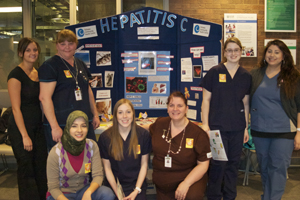Campus Health Centre hosts Hepatitis C information session
April 23, 2012

People may be hearing more about Hepatitis C these days, a potentially serious, but treatable disease that is growing more prevalent in Durham Region. But among university and college students, the overall Hep-C awareness level is surprisingly lacking.
“There’s just not enough education about it,” said Kristin Ward, a third-year UOIT Nursing student. “There’s a high-risk for our age group (18 to 24). A lot of people have said they got the vaccine for Hepatitis A, B and C, but what they don’t realize is there is no vaccine for Hepatitis C.”
To promote awareness and provide students with the facts they need, the Campus Health Centre hosted a Hepatitis C information session with Nursing students and professors from UOIT, Ryerson University in Toronto and Fleming College in Peterborough.
Hepatitis C is a virus and affects the liver, causing the organ to become inflamed. Most people with the virus are only carriers who pass it on to others, but some patients can suffer from liver failure or liver cancer. There are an estimated 250,000 people in Canada living with the disease, many unaware that they have it at all.
Hepatitis C is spread primarily through blood-to-blood contact with such instruments as poorly sterilized medical equipment, as well as infected razors, toothbrushes, and piercing and tattoo tools. The disease can also be spread through intercourse or the sharing of needles with an infected person.
The virus can be treated with medication so people are urged to get tested by a health-care professional and to take care when handling objects that have come into contact with another person’s blood.
For more information on Hepatitis C, visit the Canadian AIDS Treatment Information Exchange (CATIE) Hep C Info website.



